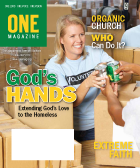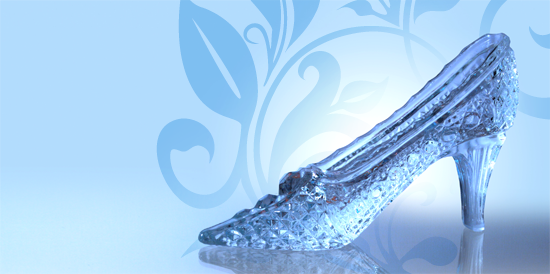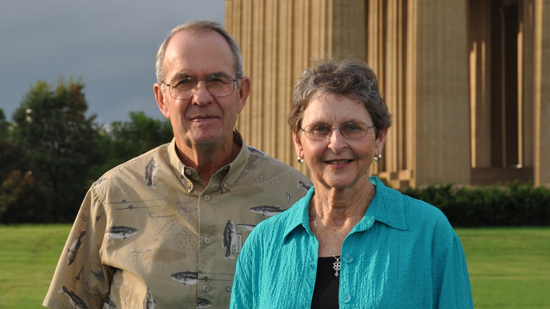
June-July 2013
God's Hands
------------------
|

Cinderella Woman
by Bill and Brenda Evans
Music critic Will Friedwald recently said, “When it comes to transformations, Rodgers and Hammerstein wrote the book.”
I don’t know about other things Friedwald writes—here he is talking about the musical Cinderella—but on this, he is wrong. R & H didn’t write the book on transformations. God did.
Ask Janie Aldridge. She has lived a once-upon-a-time story with real-life transformations. The way she tells it is that the glass slipper fit, and God gave her Prince Jimmy. She dreamed of faraway continents, and God took her to Africa, Europe, Asia, and South America. She imagined being a Great Commission nurse, and God sent her to remote villages in Côte d’Ivoire, West Africa, as His ambassador and healer.
A conversation with Janie is a conversation about the God-transformations in her life. He didn’t use pumpkins, wicked stepsisters, or fairy godmothers but amazing people. As a young child, Janie met Trula Cronk, missionary to India, who corresponded with her family about missionary life in Bihar, North India. Janie’s heart turned Godward and toward other continents. “I realized that my life was not my own. In eighth grade, I wrote in one of my school papers that I wanted to be a missionary nurse,” she said. Then in the mid-1950s, Janie mused over the murders of five missionaries in the jungles of Ecuador. She felt a transforming, danger-filled call.
Go ahead, Jane Aldridge says. Put your life on the line and slip your foot into the glass slipper. Be a real-life Cinderella...
By 1958, she was at Welch College where she met “Prince Jimmy.” Within five years they had married, she had finished her nursing degrees, he had completed post-grad work at Columbia International University, and they were in French language school in Lausanne, Switzerland, preparing for village ministry in Côte d’Ivoire, West Africa.
What are the most defining influences God has used to do His transforming work in Janie’s life? Godly people, first of all, she says. Not only Trula Cronk, but Mrs. Phillips, childhood Bible teacher, and two churchmen who saw to it that she went to a League Convention for young people. Much later, two strangers “as if out of nowhere,” a man and woman who spoke English and at midnight offered to find her and Jimmy a bed as they left a train in a foreign country that spoke a language she and Jimmy did not understand. Then there is her colleague and medical guide, Dr. Laverne Miley who provided medicines and counsel for her dispensary in a Côte d’Ivoire village. And many others, Janie says. God uses people to transform and equip us.
God’s humbling but empowering hand is another strategic influence. “Jimmy and I nailed down some things before we began life’s adventure together,” Janie says. “God would be our priority. We would allow Him to order and direct our steps. We would trust and delight in Him. We would live for Him, not for ourselves. What a mystery that is: when I give my life away, I find it. When I hold on to it, I lose it. I was certain that if I gave my life to Him, He would give me the desires of my heart, and He has.”

Photo: Jimmy and Janie Aldridge continue to live their Cinderella story together.
In Côte d’Ivoire, Janie gave herself to medicine, teaching, prayer, and became “the white miracle maker with powerful medicine.” Villagers hand-built a simple medical building—concrete floor, tin roof, and a porch waiting room—and provided a helper named Mark. She began each treatment day with Scripture thoughts and prayer. Once, villagers came with an 11-year-old boy that Janie heard struggling for breath 100 yards away. She had recently been to Doropo for medical supplies from Dr. Miley, among them an asthma medicine. She did an IV stick and slowly injected the precious fluid. The boy’s breathing eased. Within days, many others came asking for the mysterious healing medicine.
Among her 30 or 40 basic drugs were several antibiotics, including miracle-working penicillin. When a common disease called yaws infected a villager, nodules formed on the skin, turned crusty, and finally advanced into deep, open painful ulcers. Penicillin worked wonders. Janie was living her missionary-nurse dream.
Another transforming influence in Janie’s life has been her willingness to live on the edge, not only the edge of a jungle, but of life itself. “Critters,” as she calls tropical animals and insects, kept them on the alert inside the house and out and were always a physical threat, especially deadly snakes and scorpions. So Jimmy learned the art of snake handling, she says.
At times, even the weather pushed them to the edge. Aboard a cargo vessel off the west coast of Africa, they pitched, rolled, and spun wildly during a three-day tropical storm. The captain feared the hull would break apart. Janie and Jimmy wondered about the old, rusty lifeboats stowed along the decks, remembered Jonah, prayed, and made evacuation plans. On the fourth day, “we rode out from behind the Canary Islands onto a glassy sea, calm and still beyond belief,” Janie says. “That’s when we learned a huge oil tanker had recently gone down right where we had been, but God had taken care of us.”
Living on the physical edge is daunting, but the social and religious edge is even more challenging. To be on the fringe is to be an outsider, far away from the center, away from the mainstream, even the mainstream Christian life. Spiritual skirmishes abound on these extremities and battles that bring life-and-death sharpness. All are reminders, Janie says, of God’s promises: “Don’t be afraid. I am with you. My strength is made perfect in your weakness. My grace is sufficient.”
Living on the edge brings a smile to Janie’s face: “You get it all. It is everything you can imagine: exciting, scary, interesting, confusing, exhilarating, frustrating.” When she and Jimmy returned to stateside ministry after 22 years in Côte d’Ivoire, a very old woman gave them her 300-year-old, hand-carved Ashanti stool. Ashanti society is matrilineal: the family line passes through a woman and a woman’s stool is the seat of her soul. At a man’s command, she sits on the stool to signal she will marry him. When she dies, the stool is deposited with others into a special room cared for by an elderly woman in the family who is charged, not only with the stool’s care, but also with remembering the name and family history of each owner. This “keeper of the stools” is an important religious figure who oversees hundreds of stools representing souls of ancestors watching over their family lineage.
The Ashanti stool reminds Janie what it means to be a Christian woman responsible for the souls of others. “A man wants a battle to fight, an adventure to live, a beauty to rescue. A woman has many of those same desires,” she says. “I challenge women not to not be afraid to follow their hearts. Take a risk under God’s eye, be brave, and meet the challenge. Dare to step out and realize those dreams. Life with God is an adventure, and at times it will seem like a fairy tale.”
In the end, Janie always returns to Psalm 37: “Delight yourself in the Lord, and He will give you the desires of your heart.” Go ahead, she says. Put your life on the line and your foot in the glass slipper. Be a real-life Cinderella.
About the Writers: Bill Evans, former director of the Free Will Baptist Foundation, lives in Catlettsburg, Kentucky, with his wife Brenda, a retired English teacher. Visit www.fwbgifts.org for more information on planned giving.
|
|

